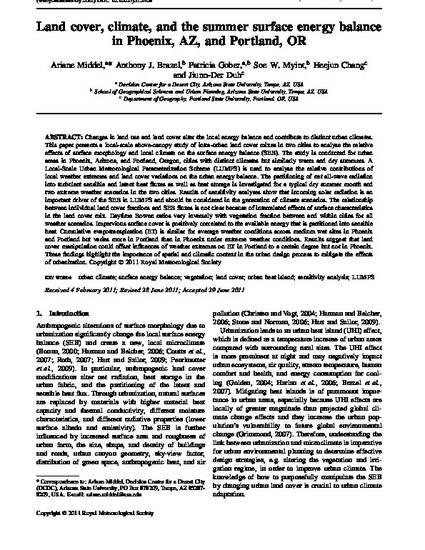
- Climatic changes,
- Surface energy,
- Land cover,
- Solar radiation
Changes in land use and land cover alter the local energy balance and contribute to distinct urban climates. This paper presents a local-scale above-canopy study of intra-urban land cover mixes in two cities to analyse the relative effects of surface morphology and local climate on the surface energy balance (SEB). The study is conducted for urban areas in Phoenix, Arizona, and Portland, Oregon, cities with distinct climates but similarly warm and dry summers. A Local-Scale Urban Meteorological Parameterization Scheme (LUMPS) is used to analyse the relative contributions of local weather extremes and land cover variations on the urban energy balance. The partitioning of net all-wave radiation into turbulent sensible and latent heat fluxes as well as heat storage is investigated for a typical dry summer month and two extreme weather scenarios in the two cities. Results of sensitivity analyses show that incoming solar radiation is an important driver of the SEB in LUMPS and should be considered in the generation of climate scenarios. The relationship between individual land cover fractions and SEB fluxes is not clear because of interrelated effects of surface characteristics in the land cover mix. Daytime Bowen ratios vary inversely with vegetation fraction between and within cities for all weather scenarios. Impervious surface cover is positively correlated to the available energy that is partitioned into sensible heat. Cumulative evapotranspiration (ET) is similar for average weather conditions across medium wet sites in Phoenix and Portland but varies more in Portland than in Phoenix under extreme weather conditions. Results suggest that land cover manipulation could offset influences of weather extremes on ET in Portland to a certain degree but not in Phoenix. These findings highlight the importance of spatial and climatic context in the urban design process to mitigate the effects of urbanization.

This is the publisher's final PDF.